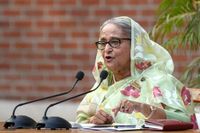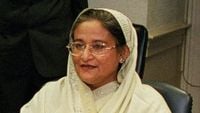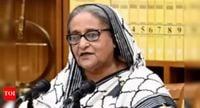Prosecutors in Bangladesh have made a historic demand: the death penalty for former Prime Minister Sheikh Hasina, who stands accused of orchestrating a deadly crackdown on student-led protests in 2024 that ultimately toppled her government. The call for her execution comes amid an ongoing trial that has gripped the nation and drawn international scrutiny, with Hasina, now 77, living in exile in neighboring India and being tried in absentia.
On October 16, 2025, Chief Prosecutor Tajul Islam addressed the Dhaka-based International Crimes Tribunal, leaving little doubt about the gravity of the prosecution’s case. According to BBC, Islam stated, “Sheikh Hasina is the mastermind of all the crimes. She is a heartless criminal. She deserves the maximum punishment. For the murder of 1,400 people, she ought to have been hanged 1,400 times.” He concluded, “Since that is not humanly possible, we demand at least one.”
The tribunal’s proceedings mark the first time in modern Bangladeshi history that a sitting or former leader has faced such severe charges. The indictment, handed down in 2025, accuses Hasina of crimes against humanity related to the violent suppression of protests in July and August 2024. These demonstrations began as an outcry against civil service job quotas favoring relatives of those who fought in the 1971 war of independence, but quickly escalated into a nationwide movement calling for Hasina’s resignation.
According to a United Nations report, the unrest resulted in the deaths of approximately 1,400 people, including hundreds of students and children. The violence reached its peak on August 5, 2024, when Hasina reportedly fled Dhaka by helicopter as crowds stormed her residence. BBC investigations revealed that police killed at least 52 people in a single neighborhood that day—one of the deadliest instances of police violence in Bangladesh’s history.
Chief Prosecutor Tajul Islam did not limit his demands to Hasina alone. He also called for the death penalty for her close aide, former Home Minister Asaduzzaman Khan Kamal, who is currently in hiding. The tribunal will decide the fate of former police chief Chowdhury Abdullah Al-Mamun, who remains in custody after reportedly pleading guilty and agreeing to testify for the prosecution. Islam’s statements, echoed by the state-run news agency, painted Hasina as intent on clinging to power “permanently, for herself and her family.”
Prosecutors allege that Hasina ordered security forces to “use lethal weapons” against protesters—a claim she vehemently denies. A leaked audio clip, cited by BBC, purports to capture her giving that order, but Hasina’s supporters and defense team argue the evidence is either fabricated or taken out of context. Her state-appointed defense lawyer maintains that the police only opened fire in response to violence from the protesters, not on Hasina’s direct orders.
The legal proceedings have expanded rapidly. Earlier in October 2025, the tribunal filed ten additional formal charges against Hasina and thirty others, including allegations of forced disappearances and mass killings during her administration. Hasina and Kamal are being tried in absentia, while Mamun’s cooperation with prosecutors adds another layer of intrigue to the already complex case.
Hasina’s fall from power was both dramatic and swift. Once hailed as one of South Asia’s most powerful women, she served four terms as prime minister and was credited with significant economic progress. Yet her tenure was also marked by widespread allegations of corruption, repression, and authoritarian rule. According to 5Pillars, rights groups and international observers have long criticized her government for suppressing dissent and using lethal force against demonstrators.
As the protests intensified in 2024, the Bangladeshi army withdrew its support for Hasina’s government, effectively sealing her fate. She fled to India, where she has remained ever since. In the chaos that followed, her family home was destroyed—a loss she condemned in a statement released through her son. Hasina has consistently rejected all accusations, labeling the tribunal’s proceedings as a politically motivated attempt to erase her legacy. She insists she never ordered a crackdown and expresses grief over the violence that unfolded.
Her supporters echo these sentiments, claiming that the charges stem from political rivalry rather than genuine evidence of systematic atrocities. There was no immediate comment from Hasina or her party following the prosecutor’s latest demands, as reported by multiple sources on October 17, 2025. Her lawyer, Amir Hossain, has called the allegations “baseless” and lacking in credible proof.
Nevertheless, the legal challenges facing Hasina and her family continue to mount. In July 2025, she was convicted in absentia for contempt of court and sentenced to six months in prison. She also faces a raft of corruption charges, as do several relatives—including her daughter Saima Wazed, a senior United Nations official, and her niece Tulip Siddiq, a British lawmaker. Both women deny any wrongdoing, but like Hasina, they have refused to return to Bangladesh to face trial.
The fallout from the 2024 protests has reshaped Bangladeshi politics. Hasina’s Awami League party has been banned from all political activities, including participating in the upcoming national elections scheduled for February 2026. The opposition Bangladesh Nationalist Party (BNP) is now considered the frontrunner, a dramatic reversal of fortunes from just a year prior.
Bangladesh’s transitional government, led by Nobel laureate Muhammad Yunus, has formally requested Hasina’s extradition from India. So far, New Delhi has not responded, leaving Hasina’s future uncertain. For now, she remains a fugitive, facing the possibility of execution if convicted—a fate unprecedented for any Bangladeshi leader.
The international community is watching closely. The United Nations and several human rights organizations have called for transparency and fairness in the tribunal’s proceedings. They urge Bangladesh to adhere to international legal standards and to ensure that justice is served without political interference. The case has also sparked debate about the broader state of democracy and rule of law in Bangladesh, which has experienced cycles of military intervention, political upheaval, and contested elections since its independence in 1971.
As the trial moves forward, questions abound. Will Hasina ever return to face justice? Can the tribunal deliver a verdict that satisfies both the demands for accountability and the need for due process? And what does this episode mean for the future of Bangladeshi democracy?
One thing is clear: the legacy of the 2024 protests and the subsequent crackdown will continue to shape the country’s political landscape for years to come, with Sheikh Hasina’s fate hanging in the balance.



